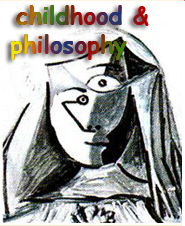which image of the aporia get the pupils immerged in the heart of the aporetic mentoring disposal?
Keywords:
aporie, encadrement aporétique, autonomie de pensée, Platon, aide à la pensée.Abstract
With the prospect of helping pupils to build up both a citizen identity and an better autonomy of thinking, the Research Unit in “Philosophy for Children and Teenagers” (PPEA) of the HEP Fribourg (Switzerland) offers a method to conduct a philosophical discussion: aporetic mentoring. This method, inspired by Platonism, consists in leading the pupils in the aporia, witch means to force them to challenge their own opinions and therefore confronting them with the limits of their critical thinking. During the school year 2013, pupils from a 5th Grade class (10- 11 y.o.) have participated in 23 PPEA aporetic mentoring lessons. At the very end, they were asked, through a questionnaire and a semi-structured interview, to tell what they were thinking about the aporia; the purpose was to see if they would ultimately consider the aporia as an help or an obstacle to critical thinking and use the results to qualitatively validate the method of aporetic mentoring. This article describes the previously mentioned Field Investigation, by presenting, in a first part, the genesis of aporetic mentoring as is it described by the PPEA Research Unit from the HEP Fribourg and by reporting, in a second part, the results of the qualitative analysis of the aporia done by the pupils who were subject to aporetic mentoring. mots-clés : aporie, encadrement aporétique, autonomie de pensée, Platon, aide à la pensée, pratique de la philosophie pour Enfants et adolescents, PPEA (philosophie pour enfants et/ou pour adolescents).Downloads
Download data is not yet available.
Downloads
Published
2015-06-10
Issue
Section
articles



